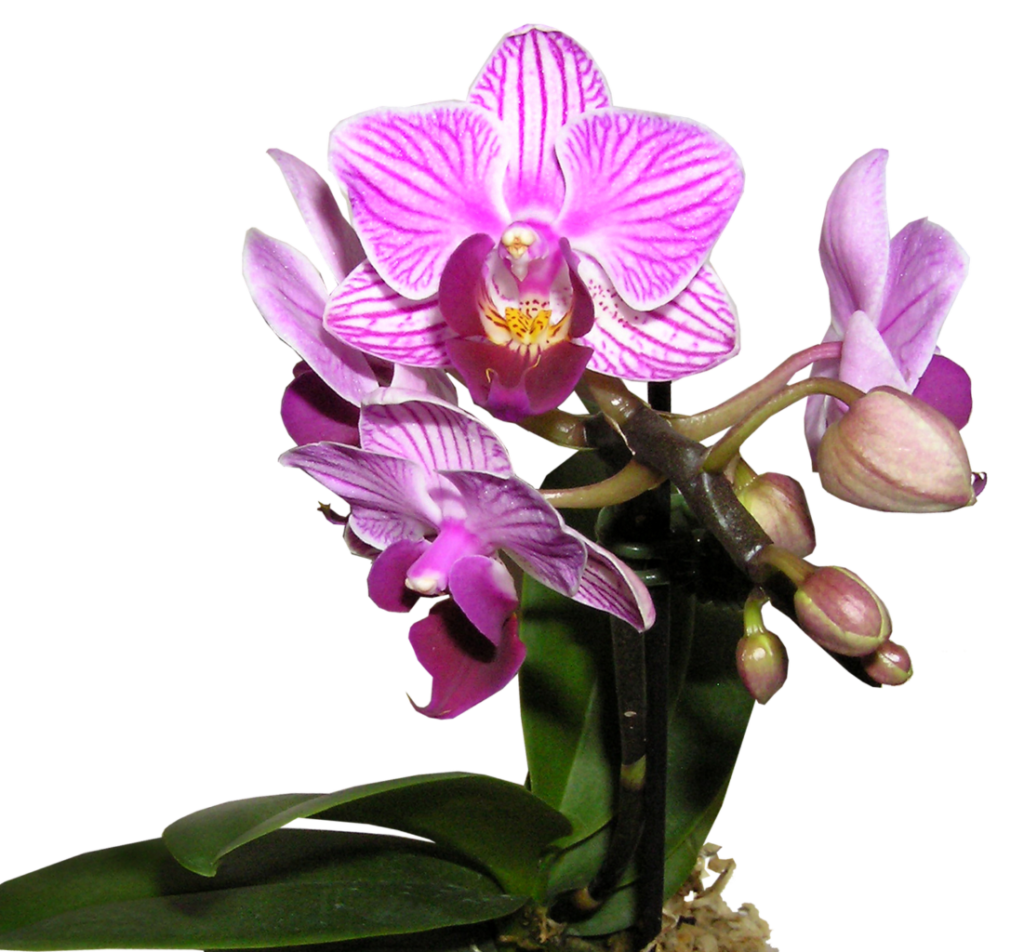Pollen is among the biggest culprits when it comes to Phoenix allergies, and this is mostly in the spring, when plants, trees, and grass start blooming again and start the pollination process. Therefore, many of those who suffer from hay fever are cautious when it comes to flowers, as these can make their allergy symptoms get worse. No flower can be considered allergy-free, however, allergic reactions to orchids are very rare because instead of airborne pollen, their pollen clumps in pollinia, or wax-like, tiny balls.
Do Orchids Cause Allergies?
Generally, no. Orchids are seldom a source of pollen allergies due to several unique characteristics that set them apart from other flowering plants.
People who have pollen allergies can usually enjoy having orchids around without triggering uncomfortable symptoms, because the pollen of orchids is not airborne; it’s contained within structures known as pollinia.
But do orchids cause allergies, even if they don’t have airborne pollen, like other flowers? Continue reading to find out if you can finally replace those artificial flowers with real ones instead.
Understanding why orchids are less likely to cause allergic reactions requires delving into the specifics of pollen-related allergies, broadly known as hay fever.
What is hay fever?
The allergic reaction to pollen is called hay fever and it can be caused when you come into direct contact with the fine powder from plants, called pollen. In the case of allergy sufferers, the immune system mistakenly identifies the pollen as dangerous and begins creating chemicals, such as histamine to fight against the intruder.
Sneezing, itching or watery eyes are some of the most common symptoms and if you are experiencing any of them, make sure you consult a board-certified allergy specialist for testing and a treatment plan.
Interestingly, hay fever does not only act seasonally; for some, it’s a year-round struggle known as perennial allergic rhinitis, triggered by indoor allergens like pet dander, mold, and dust mites in addition to pollen. The implications of hay fever stretch beyond physical symptoms, often impacting an individual’s sleep quality, focus, and overall daily functioning.
Why are orchids likely not to cause pollen allergy?
Due to their exotic look in a range of colors, orchids make for a great houseplant, not to mention the fact that it’s long-lasting (if correctly cared for, they can even last for years).
The Asthma and Allergy Foundation of America has chosen orchids as their official flower and the reason is simple: their pollen is harmless. Why? Because, as already mentioned above, it is not airborne, and stays secured inside the flower’s pollen packet. Because orchid pollen is intact and concealed inside, allergy sufferers can sniff orchids and keep them as a houseplant, without worrying that their symptoms will be triggered.
Furthermore, orchids serve not only as a safe option for people who have allergies but also as a serene and visually stunning addition to any interior. Their vibrant colors and intricate structures have a scientifically-backed impact on enhancing mood and indoor ambiance.
Beyond their beauty and allergen-friendly nature, orchids are also relatively easy to care for, with minimal watering and light requirements, making them a hassle-free addition to homes and offices. It’s remarkable how these lovely blooms can thrive and potentially bloom several times a year with the right conditions and care, continually bringing joy without the worry of exacerbating allergy symptoms. This low-maintenance aspect, coupled with the peace of mind regarding allergies, makes orchids a standout choice for indoor florals.

Orchid sensitivities
Orchid allergies or sensitivities can be caused by other factors than pollen. Your physician can rule out other conditions that may be causing the reaction and will set up the right treatment whether it’s a medical one or not.
Here are some of the most common allergies that people can develop to this beautiful flower.
Orchid Sap Sensitivity
Orchid sap contains calcium oxalate crystals, which can irritate the skin upon contact. Some individuals might be more susceptible to these irritations, particularly if they have sensitive skin or existing skin conditions.
The medical term for this is dermatitis and it can potentially develop when pruning or cutting the plant. The surface of the skin is affected causing an itchy rash. Other symptoms are blisters, redness or soreness of the affected area. If this doesn’t go away and becomes persistent, see medical assistance and avoid using perfumes, harsh soaps, or jewelry. Wearing gloves while pruning and cutting the orchids can also help avoid reactions.
Solutions and Alternatives
- Immediately wash the area with cool water and mild soap.
- Use a cold compress to manage any initial inflammation.
- Apply a soothing aloe vera gel.
Orchid Fragrance Sensitivity
If you notice that you have developed a particular sensitivity to orchid scent, make sure to avoid the cattleya and cymbidium varieties and go for Phals, Paphs, Masdevallias or Oncidiums which have no perfume. Sensitivity to orchid fragrance can cause headaches, nausea, skin rashes, breathing difficulties or runny nose.
Solutions and Alternatives
- Ensure that orchids are kept in well-ventilated areas.
- Utilize air purifiers with HEPA filters to minimize the impact of fragrances.
- If certain species are irritating, opt for non-fragrant species like Paphiopedilum.
Artificial fertilizers
Pesticides, herbicides, fungicides or artificial fertilizers are chemicals that can cause mild to severe symptoms like severe rashes or breathing problems. If you have come into contact with any of the possible allergens, consult with your doctor to see which one is giving you the reaction.
It’s crucial to remember that every person’s body reacts differently. So, while orchids are typically a safe bet for most, paying close attention to how your body responds when you’re around them ensures that you can enjoy their beauty without any surprise sneezes or itches.
Solutions and Alternatives
- Consider utilizing organic fertilizers, such as worm castings or fish emulsion.
- Always wear protective gear, like gloves and masks, when handling chemical fertilizers.
- After use, store fertilizers and chemicals safely out of reach of children and pets.
The take home
Although orchids are considered to be the most allergy-friendly plants, some factors can develop sensitivity, such as fragrance or orchid sap. Preventative measures can help you exclude possible unwanted reactions, such as ventilation of the room where the orchids are, minimal use of chemicals and protective equipment such as gloves for the care of the orchids.
Suppose you developed any of the above-mentioned sensitivities to orchids. In that case, our specialized allergy associates can help you determine the exact allergen and set up the right treatment plan for you. Observing any changes in health and wellness after bringing an orchid into your space ensures that any potential, albeit rare, allergens are identified promptly.
If you or a loved one are experiencing symptoms or suspect that orchids or other flowers might be causing allergies, it’s essential to seek expert advice. At Arizona Allergies Associates, our dedicated team of specialists is here to help. Get in touch to book an appointment!



